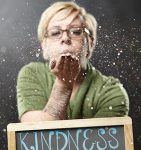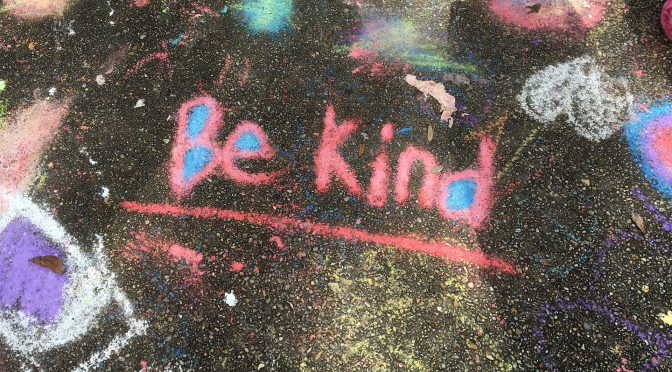Kindness is underestimated, but as soft as this state of being sounds, it is powerful in its own rite. By practicing kindness in our homes and communities, we are promoting — through our actions and words — what world peace and harmony looks like in human behavior. A really amazing characteristics of kindness is that it benefits the giver as much as the recipient, and it’s contagious!
 Here to shed more light on kindness is Brooke Jones, the vice president of the Random Acts of Kindness Foundation.
Here to shed more light on kindness is Brooke Jones, the vice president of the Random Acts of Kindness Foundation.
Q: To begin, please share how our society views kindness and why your organization focuses on kindness.
A: Kindness truly is underestimated. People see it as something that’s nice, but they don’t see the true impact one single act of kindness has on others. The ripple effect is real.
We may not always know the impact we have on others, but I would challenge everyone to think of a significant act of kindness in their lives. Perhaps it was a teacher telling them they did a really nice job on an essay and it boosted their self-confidence and stuck with them for years, possibly opening up a career choice for them that they wouldn’t have otherwise considered. Maybe it was the way a grandparent always made time for them when others didn’t. It could be a friend who said exactly the right thing at a very difficult moment.
Kindness is deep. Kindness is transformative. It is incredibly powerful and is a legitimate foundation for true change in this world.
Q: What are the goals of the Random Acts of Kindness (RAK) Foundation?
A: We believe the world will be a better place if we encourage the spread of kindness in schools, communities, and homes. We do this through social media and an evidence-based K-12 curriculum which we offer for free to all schools — English and Spanish.
We focus on the science behind kindness, as well. Science has shown that performing random acts of kindness are good for you. They improve your life satisfaction by increasing your sense of belonging and self-worth, and they improve your health by decreasing your anxiety, depression, and blood pressure. The best part is the benefits apply to the giver of kindness, the recipient, and the witness of the act.
Q: You mentioned RAK’s Kindness in the Classroom curriculum offered at no cost to schools. Please share more about this.
A: We have a real soft spot in our hearts for teachers. They are on the front lines dealing with so much more than any of us know. They often have 30-plus kids in a classroom, many of whom have learning disabilities, come from abusive homes, live in extreme poverty, are under incredible pressure from their parents. Each of those kids has a story and their own baggage when they come into the room.
The teacher has to be a safe haven for these kids, and they don’t have the luxury of managing some of their own personal problems when they are working with the kids each day. They often suffer from compassion fatigue and don’t take care of themselves. We want to help teachers find that passion and drive they had when they first started teaching and encourage and inspire those that adore their jobs!
Our curriculum focuses on the social and emotional development of students through the lens of kindness. Spending 30 minutes, once a week, they walk through the kindness paradigm — inspire, empower, act, share — and build pro-social skills like self-awareness, responsible decision-making, relationship skills, social awareness, and self-management. The kindness concepts make it easy for the class to relate to these skills when they talk about caring, compassion, integrity, gratitude, respect, helpfulness, perseverance.
One example of this is the lesson plan for 4th grade about respecting beliefs and opinions. There are several activities and examples of fairness, integrity, and respect. The lesson is fun and engaging while also teaching valuable life skills.
Q: Among the resources your organization is known for is Random Acts of Kindness Week each February. How did this annual observance begin?
A: No one really knows the origin of RAK Week, but we know that it was the subject of an Oprah Winfrey show back in 1994 and a resolution designating RAK Week was introduced in the House by Rep. Walter R. Tucker of Compton (California, USA).
During RAK Week, we encourage people to be loud with their kindness. We want people to be kind every day of the year, but during RAK Week, it’s a time to really step it up and do something above and beyond. This could be anything from starting a RAK Club at your school to bringing flowers to a coworker. The possibilities are endless!
We are trying to promote the idea of integrating kindness into our daily lives and finding ways to incorporate it into even the most mundane tasks. For instance, we all have to wake up and get ready in the morning. Why not add a moment of kindness into your morning ritual? If you have your cell phone next to your bed, send an uplifting text message to someone you care about.
Interview by Rita Brhel, Attachment Parenting International

